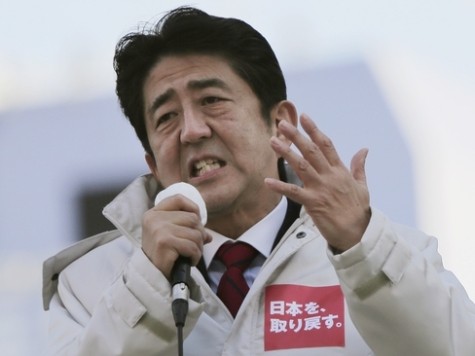The Chinese foreign ministry announced today that it does not have any intention of allowing Japanese Prime Minister Shinzo Abe into their nation again after the latter visited a shrine honoring Japan’s dead during World War II.
According to the AP, a Chinese Foreign Ministry spokesman announced that Abe was no longer welcome in China since his visit to the Yasukuni Shrine, a monument in Tokyo in which several World War II war criminals and imperialist figures remain enshrined. The Chinese called such a move “hypocrisy” on Abe’s part, as Abe has previously said that normalizing relations with China was a major goal of his administration. Imperial Japan colonized large parts of Korea and China, particularly the northern province of Manchuria, and are said to have killed millions in the decades leading up to World War II. Given the role that some memorialized at Yasukuni played in the oppression of Imperial Japan’s colonies, the Chinese government is arguing that Abe’s visit to the shrine is an endorsement of the crimes of the imperial period.
“The Chinese people do not welcome him. Now, Abe needs to admit his mistakes to the government and people of China, cut loose from the past and make a new start,” said the Chinese Foreign Ministry spokesman. Xinhua, the state news agency of China, reported that opposition to Abe’s visit has come from all sides of the political spectrum, with the Obama administration’s State Department expressing “disappointment” in Abe’s visit– after all, Imperial Japan is also responsible for the attack on Pearl Harbor that brought the United States into WWII. Russian and South Korean representatives also expressed dismay at the potential veneration of the crimes of Imperial Japan, a representative of the latter expressing “anger” at the visit to the shrine.
Abe said in a statement that he did not intend “at all” to insult the victims of Imperial Japan, only to “pray for the souls” of WWII soldiers. What the international backlash will mean for Japan, however, remains to be seen. Abe is wildly popular among his constituency, winning a resounding electoral victory in this past July. His nation is locked in a heated diplomatic dispute with China that puts him on the side of the United States and South Korea, refusing to accept China’s Air Defense Identification Zone (ADIZ) over Japanese islands that require other sovereign nations to identify their aircraft or face violence. Abe has threatened “force” should China actively oppose the free travel of Japanese vessels in the region, and the situation remains tense. With Abe now apparently unable to enter China after his controversial shrine visit, whether talks will result in a peaceful resolution of the ADIZ situation remains up in the air, their communication complicated by centuries of violent history.

COMMENTS
Please let us know if you're having issues with commenting.